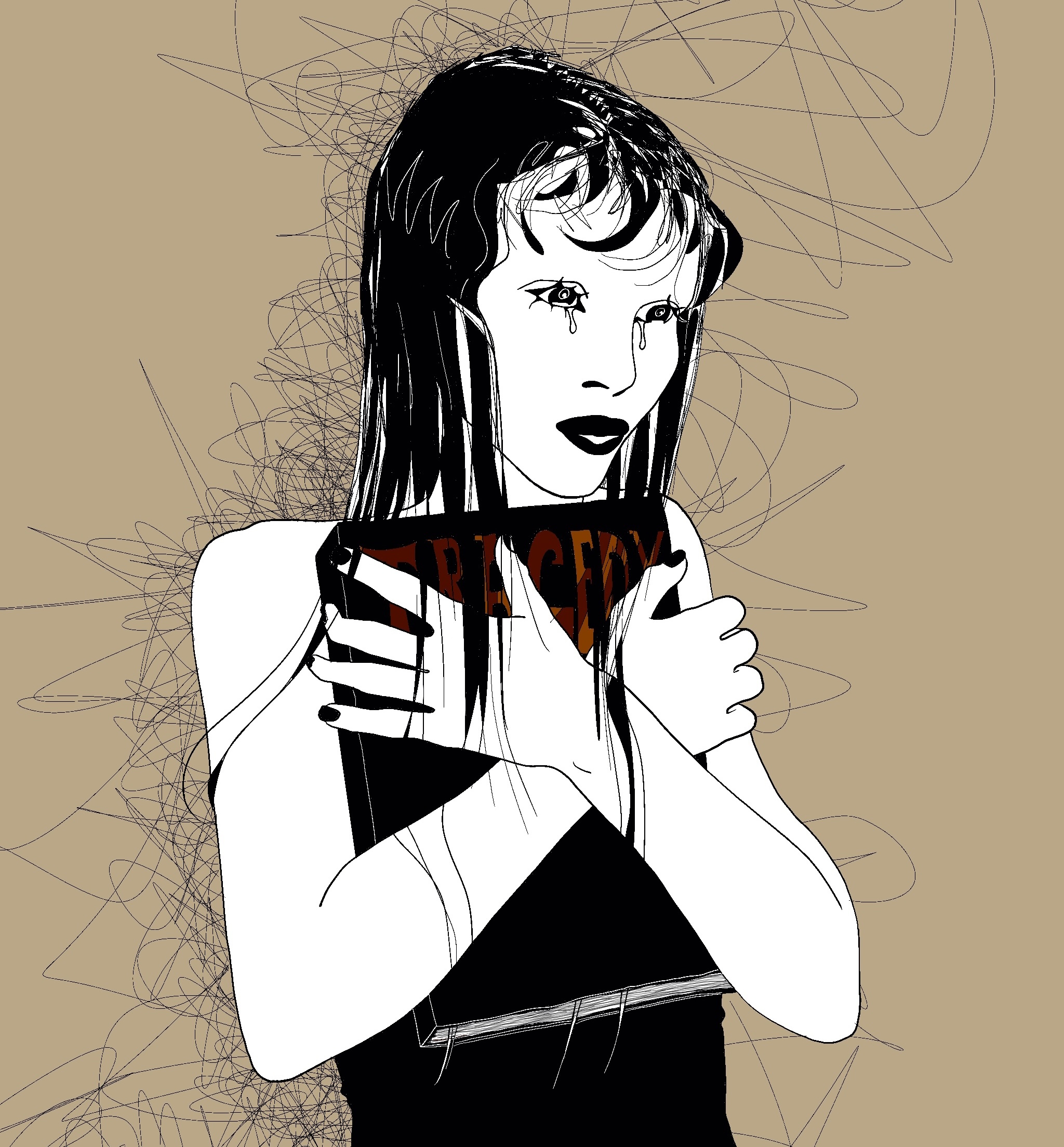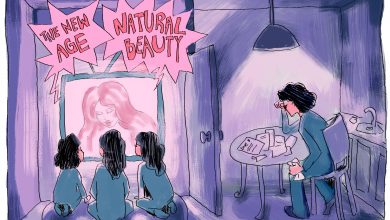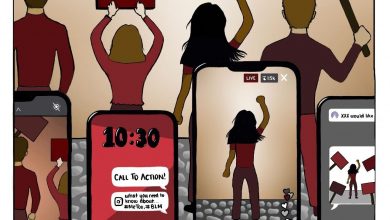What’s Wrong With BookTok

Image description: A person with long black hair and tears in their eyes clutches a black book to their chest against a beige background. Written in large red letters on the book cover is ‘Tragedy.’
Image Credit: Coral Utnehmer
As a book lover, my TikTok and Instagram For You pages are filled with book recommendations of the most popular novels and young adult romances. Colleen Hoover, Sally Rooney, and other white female authors monopolize my feed, as TikTok’s algorithms push books such as “It Ends with Us” and “Normal People.” These young adult (YA) novels dominate much of ‘BookTok’ and ‘Bookstagram,’ the sides of these apps where individuals make book recommendations and share reading updates, new novel finds, and their opinions on these YA novels.
My personal experience scrolling through BookTok and Bookstagram often leaves me frustrated and lacking any noteworthy book recommendations. I get tired of seeing the same novels over and over again, and the videos in which these novels are recommended are completely devoid of any meaningful literary discussions, instead choosing to focus on superficial aspects, like the allure of the male main character or the details of a slow-burn romance.
My lack of interest in such genres led me to avoid these book recommendations, instead opting for more niche content creators who shared poetry collections, obscure philosophy books, and creative nonfiction from all over the world. Yet the popularity of Colleen Hoover’s “It Ends with Us” allured me. What could possibly be so phenomenal about this book that it has remained a New York Times bestseller years after its 2016 publication?
I began listening to an audiobook of the novel during work and was not surprised that its potential for literary merit failed to live up to its hype. The novel starts out as a romance between two absurdly named characters, Lily Bloom and Ryle Kincaid. Quickly, however, we begin to see the trauma of Lily’s childhood, her rekindling of a childhood romance, and the horrific deterioration of her relationship with the abusive Ryle.
Unfortunately, a novel that is meant to be a harrowing portrayal of abuse in seemingly-healthy relationships instead grossly romanticizes abuse and trauma, misleading young girls into thinking that all relationships are marked by secrets and horror. The transformation from YA romance to trauma and deeper themes was poorly executed by Hoover and led me to quickly put the book down.
Similar patterns exist across many of BookTok’s romance novels. Popular novels involve almost absurd levels of personal trauma that the main characters, usually women, have dealt with. Ana Hwang’s “Twisted” series—‘steamy’ romance novels between people who have experienced significant personal trauma—promote harmful stereotypes about abuse, violence, and tragedy. Each character’s backstory is marked by some form of horrific event: Alex’s parents were murdered in front of his eyes, Jules has a stalker ex-boyfriend and an inattentive mother who neglected her as a child. However, Hwang glosses over the trauma, and the main characters are all attractive, career-oriented, and successful.
The “Twisted” series as a whole not only perpetuates the notion that trauma is normal and insignificant, but that to be desirable, a woman must no longer be associated with that trauma. To be an independent woman, disregarding and overcoming such horrific trauma is required. It isn’t just the “Twisted” series that promotes stereotypes about trauma; BookTok and Bookstagram generally focus on novels with ‘strong female characters’ who in reality are harmful misrepresentations of the products of violence towards women.
Even more worrisome is the fact the major audience for these books is younger girls who look up to these book heroines as role models. As a child who read a lot, my role models were always from the books I read: Hermione Granger, Annabeth Chase, and Alex Bailey. Yet instead of the intelligent young girls I so wanted to be like, young girls today are basing their personalities on the copy-pasted female protagonists who dominate BookTok and Bookstagram, ones who have no real personality traits and are falsifications of female characters. While that is not to say unhealthy female role models have never existed in literature, the mainstream nature of BookTok’s protagonists leads to these role models being the forefront of what young girls aspire to become.
Additionally, the romance in these novels is superficial, with the male main character usually falling for the looks of these characters. The love stories are disingenuous and gloss over past trauma. For many of the young girls reading these novels, it is likely they haven’t experienced their first relationship or romance yet. These novels provide a skewed depiction of what healthy relationships should look like, instead encouraging a surface-level exclusionary feminism where true representation and equality are missing in favor of falsely strong female characters, and where misogyny is fed to consumers as a form of empowerment.
This commodification of feminism is rampant in BookTok and Bookstagram where such novels are marketed as representing ideal women protagonists. Instead of focusing on intersectionality and critiquing the empowered white woman narrative, these novels and the industry that sells them suggest that these female characters are the current reality of successful women, and that “equality [has already] been achieved”.
In order to gain views and following, BookTok content creators rely on certain aesthetics and tropes when reviewing these novels. Through the use of pretty book covers, elegant backgrounds, and organized bookshelves, emphasis is on how the books look as opposed to the themes they explore. Tropes, or popular plot devices employed across multiple books are also heavily relied on.
The ‘strong female protagonist’ trope is heavily overused, often solely to appeal to young readers who view such characters as an ideal they must strive towards. Voon Jung, sociology student at the NUS claims that this relatability of much of BookTok is “born out of a cynical marketing push more than any organic desire to share and relate to others,” And, as capitalistic motives drive much of what we see on social media, the commodification of feminism and other social issues results in poor, watered-down explorations of important issues of representation, visibility, and power.
In addition to the empowered female narrative present on BookTok, the Eurocentric narrative also dominates; not just in the books themselves but in the authors as well: “Almost every author who has found life-changing success via the platform […] is white.” White, female authors dominate BookTok with their white, female main characters. Once again, since young girls look to these novel characters for inspiration it is disheartening to think that people of color will find it close to impossible to relate to characters found in these novels.
Psychological studies have shown the importance of representation in childhood development, in that “exposure to negative media depictions of their own ethnic-racial groups can undermine children’s sense of self, whereas high-quality children’s media can promote positive ethnic-racial attitudes and interactions”. Growing up, I know that I never saw any South Asian characters in the media I consumed. Recently, I asked my 5-year-old niece what her favorite TV show was and she responded with “Mira, Royal Detective,” a show about a young Indian detective with the same name as my niece. As my niece was able to identify with her favorite characters in a way I never could, I was struck by how important diverse representation in the media is.
The whitewashing of BookTok and the employment of the white woman as a “factory model” from which all other racial identities skew is what CMU student, Jennifer Bartner, calls a “structural misunderstanding,” something that many of BookTok’s young viewers don’t really have a handle on. With TikTok’s algorithm promoting the same handful of books, diverse authors and characters don’t appear on many For You pages. Dominating Eurocentric narratives, combined with a lack of realistic female protagonists, result in one-dimensional main characters whose experiences are often unrelatable, harmful, and lack showcasing the diversity of the female experience.
Overall, the majority of BookTok misrepresents the lived experience of women globally, instead choosing to focus on a small minority. The genre of books promoted consists of a small problematic group of white authors with white female protagonists who contribute little to the diverse literary landscape.
Harmful narratives and stereotypical characters endanger the development of many of BookTok’s consumers and the way in which they will continue to consume media. Accurate, thoughtful representation of women’s experiences is crucial. The inherent lack of such content on BookTok’s most popular accounts and pages will only lead to cycles of prejudice, and Eurocentric narratives that do little to combat power structures prevalent in media and culture today.
BookTok must understand that in order to address these issues, it is absolutely necessary to promote BIPOC authors whose works are essential in dismantling the hegemonic narratives heavily constructed by BookTok’s algorithm and the type of content that is promoted. These works will better represent the diversity of women’s experiences, and characterize female strength and empowerment more accurately.
Going forward, we must prioritize diverse narratives and refuse to fall prey to the capitalistic motives of TikTok algorithms in order to leave behind the dominance of Eurocentric romances. I hope instead to see authors like Tasha Suri, Isabel Cañas, Tommy Orange, and R.F. Kuang take center stage, as all of them have created masterpieces where diversity is not forced; rather, the characters take the forefront and exist in rich narratives that speak to the experiences of thousands instead of a select few.




